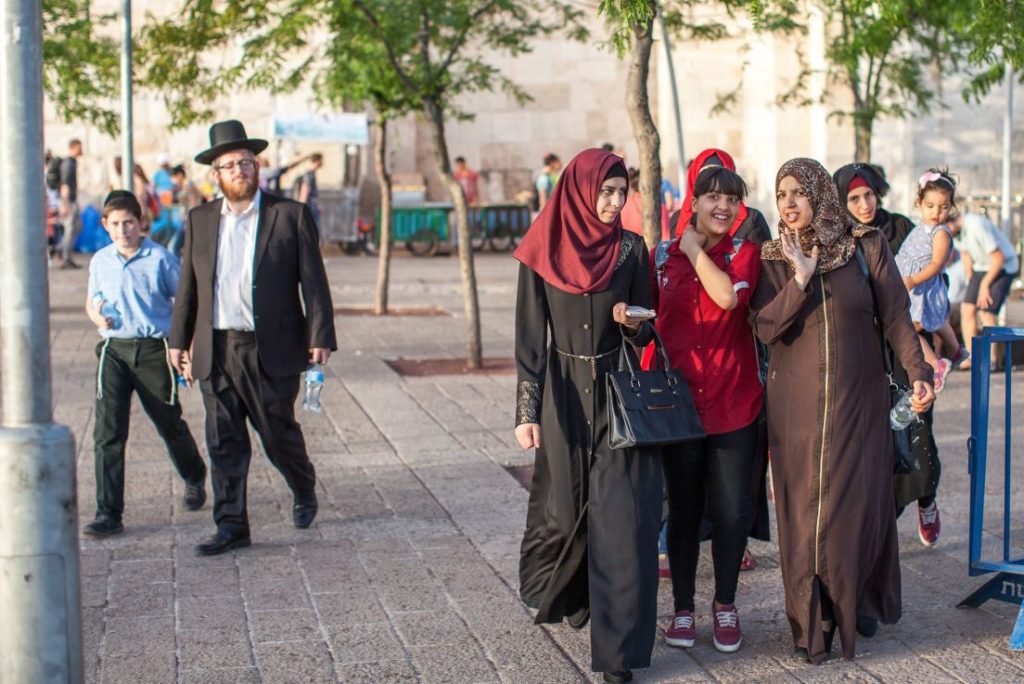Australia/Israel Review
Biblio File: Muslims and Jews – The ‘original grudge’ theory
May 6, 2020 | Lyn Julius

 Un certain “vivre ensemble”: Musulmans et juifs dans le monde arabe
Un certain “vivre ensemble”: Musulmans et juifs dans le monde arabe
Daniel Sibony, Odile Jacob, 2016, 190 pp.
In 2013, Princeton University Press published A History of Jewish-Muslim Relations: From the Origins to the Present Day, the first encyclopaedia on the history of relations between Jews and Muslims from the birth of Islam to the present day. Edited by Abdelwahab Meddeb and Benjamin Stora, the encyclopaedia is a glossy coffee-table book featuring more than 150 articles by an international team of leading experts. Its stated objective was “greater historical understanding and a more informed dialogue between Jews and Muslims.”
One man, however, was not impressed. Daniel Sibony is a French psychoanalyst and philosopher, and the author of no fewer than 26 books, most, unfortunately, not available in English. Sibony believed that “greater understanding” and “informed dialogue” meant idealising the true nature of Jewish-Muslim relations during 13 centuries of “coexistence”. He set out his response to Meddeb and Stora in a book called Un certain “vivre-ensemble’: musulmans et juifs dans le monde arabe (“A certain ‘co-existence’: Muslims and Jews in the Arab world”).
The book’s message may be summed up as follows: “Tell me who you despise, and I’ll tell you who you are.”
Sibony argues that the Muslim bears the non-Muslim ‘other’ an “original grudge,” which has coloured Muslim relations with the Jews living among them since the Koran was written in the seventh century.
Going back to Mohammed’s encounter with the Jewish tribes of Arabia, the grudge, says Sibony, consists of resentment of the Jews for “betraying” Mohammed by refusing to follow his new religion. And, he adds, there is the lingering resentment that the Jews were first out with their Holy Book.
In the Muslim mind, argues Sibony, the Jew is cursed by his primordial failure to convert. In fact, the very term “Jew” – with its apparent associations of uncleanliness and femininity – was an insult in Morocco, he notes.
The Jew is condemned to inferior, or dhimmi, status, a system of humiliating handicaps and strictures. He is banned from reading the Koran, in case he should criticise it. To argue that the colonial era in Arab lands marked a divorce between Jews and Arabs assumes that there was a marriage in the first place.
Non-Muslims kept the Islamic world afloat through payment of the jizya tax. The ruler levied this tax in order to “protect” the Jews. But protect from whom? A hostile populace which had assimilated the lessons of the Koran and the “original grudge”.
Living in the Marrakech medina in Morocco until he left for France at age 13, Sibony knew the power of the mob. Riots would erupt around the time of Jewish festivals, to the extent that one Jewish mother preparing her daughter’s wedding sought reassurance from a neighbour that his co-religionists were not planning to disrupt the festivities.
The ruler could turn the screw on his Jews when he needed them to pay heavier taxes, while threatening to unleash popular violence on them. Today’s jihadists, too, Sibony argues, are essentially mobsters.
There are plenty of Jews from Morocco willing to testify to the good relations there between Jews and Muslims. One reason was that the mob never penetrated the richer quarters; protected by the police – their Jewish residents were insulated from trouble.
Sibony claims that Jews did not want to dwell on the negative, they were too busy living life to the full – a life filled with music, poetry, ritual and faith. There were times when Muslims, too, forgot their “grudge” – but it was always there in the background, like a radio whose volume knob had been turned down. The ultimate proof that all was not well between the two communities is the massive exodus of Jews from Arab lands.
Sibony’s thesis may be criticised for putting too much emphasis on a dhimmi status abrogated by the colonial era, and for ignoring the influence of European and Nazi antisemitism in the Arab world. But in Morocco the colonial period was shorter than most, and Sibony still remembers seeing Jews wearing the discriminatory black djellaba in his native Marrakesh. He should be commended for boldly swimming against a tide of denial and distortion.
Lyn Julius is the author of Uprooted: How 3,000 years of Jewish Civilisation in the Arab World Vanished Overnight (Vallentine Mitchell, 2018). © JNS.org, reprinted by permission, all rights reserved.
Tags: Jews, Middle East, Muslims






